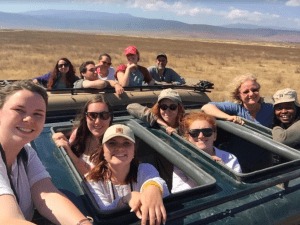
Oct 24, 2019 | Sports |
Derek Taber Contributing Writer
The last home game of the year for the UMF soccer teams welcomes family and friends as the team recognizes senior leadership, and accomplishments. The women’s and men’s teams celebrate “UMF Senior Day” in front of a home crowd, where all seniors will get to have their names introduced at half time. After a sub-par starts to the season both teams have rallied recently to win three of their last four games.
There are playoff implications in the women’s game. Fern Calkins, the junior defensive midfielder, is ready to defend the NAC title while honoring the seniors. “We are all super excited for our conference match-up this weekend against SUNY Canton and looking forward to recognizing our seniors,” said Calkins. “Our seniors have definitely played a big role in our success these past years and we really want to get this win for them.”
The women’s team started the year having lost their first five matches, but have turned things around as of late. The women have put themselves in a position to defend the conference title they won last year. Currently holding on to the sixth and final playoff seed, a win against a conference rival will greatly help the chance of defending the title.

Eden LeBlanc, Women’s Soccer (Photo courtesy of Molly Wilkie)
SUNY Canton is coming to Farmington with losses in four out of their last five games, and will try to defend the fifth seed in the conference matchup. A win would further cement their place in the standings. The UMF team is honoring four seniors at the game: Libby Ouellette F, Morgan Tortorella D, Eden Leblanc D, Mikayla Cameron GK.
The men will also play SUNY Canton in their last home game of the year and have an opportunity to climb back into the playoff hunt to grab the final seed in the conference tournament. A record of 1-4 in the conference and 7-7 overall, the men’s team will need this win to stay alive as the last four home games have ended in a loss.
Andrew Longhurst, a senior and center on the team, is looking for a victory in his final home battle. “If we win this game we are almost guaranteed a spot in the playoffs which will give us a chance to go for the NAC championship,” said Longhurst in an email interview. “I am expecting a win in my last home game. The guys have been working really hard over the past 3 weeks in preparation.”
“It’s also exciting to have my family up here for the game because I live in Delaware so I don’t get to see them too much during soccer season and throughout the year,” said Longhurst.
SUNY Canton is sitting comfortably in the fourth seat, and could wind up playing spoiler to the Beavers if they leave town with a win. However, SUNY has struggled of late losing three out of four games, so the momentum could be on the side of the Beavers.
The team is practicing hard with the season on the line. Longhurst knows the importance of preparation. “We are doing everything we can to give ourselves an advantage on them by studying film, getting our injuries taken care of, staying on top of our academics, and working incredibly hard every practice,” said Longhurst.
The Men’s team carries seven players on the roster that will be honored with their families on senior night. The team seniors are Nick Marshall C, Jake Heimlich C, Jon Randolph C, Nate Campbell D, Derek Mclaughlin D, Hunter Michaud C, Andrew Longhurst C.

Oct 10, 2019 | News |
Derek Taber Contributing Writer
Nine students are set to embark on a journey to the nation of Tanzania in East Africa where they will learn the impacts of tourism on the local communities. Eco tourism is a form of travel that involves visiting areas of pristine countries, with the intention of conserving the environment, and minimizing the footprint of conventional travel.
Professors Linda Beck and Mark Pires are the two instructors leading the excursion in Jan. 2020. Together Beck and Pires are taking the students to Tanzania for thirteen days to ingratiate them with a set of principles that will help them understand the philosophies of ecotourism.
Learning the impact on the local economy while traveling is the main philosophy that Beck hopes to instill. “In the context of Tanzania, I want to help the students understand the tourists’ roll as consumers with the sustainability of our purchases,” said Beck. “One has to be really careful of how they spend their tourist dollars.”
Large tourist corporations will move into an area and exploit the local communities, adding pressure to the already limited supply of resources. Most tourism companies are owned by foreign investors and keep the profits in foreign markets. Companies will add infrastructure, and put a drain on environmental ecosystems by building roads, and supply lines to keep the tourist well stocked.

Photo captured from the Tanzania Trip held in 2016. (Photo courtesy of Linda Beck)
“People will go off-road on safari creating a havoc to the flora and fauna, but also amongst the animals,” said Beck. The money is kept in the deep pockets of the companies and does not get redistributed. “You want to make sure the dollars you spend actually go to the local economy,” said Beck.
Thomson Safari, a tour company based in Massachusetts that leads Tanzanian safaris, had a lawsuit filed against them in 2010 by the local communities after the denizens were forced from their land and blocked from a vital water supply. Thomson was building luxury safari camps.
“The exploitation of the environment, and the people is widespread,” said Beck.
Another goal on this winter trip is to meet with local environmentalist, and observe the local ecotourism operations. The group hopes to actually engage in ecotourism as well. Beck said, “When we hike Kilimanjaro, when we go on safari, when we visit coffee farms, all of those activities will be done in a sustainable manner.”
Nelson Peterson is a student who is going on the trip to Tanzania in December. Peterson has never been to Africa before and hopes to learn what ecotourism can do for communities around the world. “It will be nice to see how other people live in a different country,” said Peterson, who is excited to help with the Porters Association.
Helping bring water to dryer areas, and lug buckets over long paths to remote villages throughout the Serengeti is a special opportunity to him. “It will be really important to help the porters, part of our trip will be to help them [Porters association] bring water to places,” said Peterson.
The impact of learning the importance of environmentally responsible behavior while traveling is the most valuable takeaway from the journey to East Africa for Beck. “Watching the students get excited about Tanzania,” she said, “[and] learning how to become a global citizen,” is something that one can take with them forever.
Sep 26, 2019 | News |
Derek Taber, Contributing Writer
The Hotel Rumford in Rumford, ME is celebrating its 130-year anniversary and UMF alumni Melissa Carrier is at the helm of a growing economy for this small mountain town.
Carrier, who graduated from UMF in 2009, has owned and operated the historic hotel and bar with her husband, Brian, for the last year and a half. Carrier is changing the vision and atmosphere of the staple establishment, and leading the charge of a growing economy. Once considered a dying mill town, Rumford has seen lowered unemployment, and a rejuvenated workforce, allowing room for growth and opportunity in the emboldened community.
George O’Keefe, the director of economic development for the town of Rumford, was hired to stimulate business growth and inject new ideas for downtown businesses to reinvigorate that Rumford has ample room to thrive and succeed. “It’s very positive to see young people staying in town, and running a business,” O’Keefe says.
The Hotel Rumford has been one of the few businesses to survive the economic downturn of the last quarter century. A shrinking logging and paper industry has been the main culprit for the lost jobs in the area. At one point there were six paper machines operating, with over 1000 blue collar jobs available. When the mill struggles, “Everyone panics,” Carrier says.
The Hotel Rumford was a haven for loggers and paper workers, allowing a place for respite, and lift of spirit from the grueling work in the woods. “This is the heart of downtown Rumford,” says O’Keefe. The town rallies around the business and frequents the establishment often.
The hotel also brings in people from out of town who come to work on shutdowns and construction projects associated with the mill.
Carrier started her business education in her sophomore year of college. She worked in the community at the Granary Restaurant and Pub in Farmington, and summers at the Kawanhee Inn in Weld. Carrier and the future head chef of the Hotel Rumford, Scott Croteau, met when Carrier was a dishwasher at Kawanhee. “Scott is an amazing chef,” Carrier said.
Croteau prides himself on delivering a fresh menu with local ingredients. “He makes almost everything in house,” Carrier laments.
The Hotel Rumford has 12 employees that work at the restaurant. The economic outreach that comes from the employment is deep. “Everyone seems to know your name when you walk in to the bar,” O’Keefe says.
The Carriers recently did some remodeling to the hotel and restaurant to bring back the staple theme of logging to the town. They decorated the restaurant with antique saws and pictures from the town when horses and carriages roamed the streets.
The difference from now and 130 years ago is substantial. Recreation and vacation destinations rival the paper industry as the main catalyst for economic growth. The potential is prevalent. If people have a place to call home when they are in town, the sentiments will only grow stronger, and the future is vibrant.

